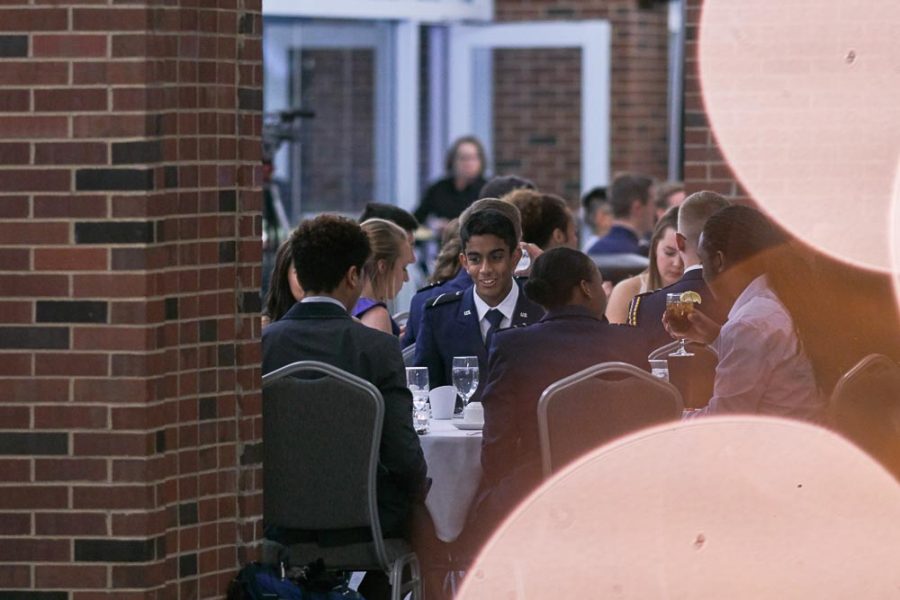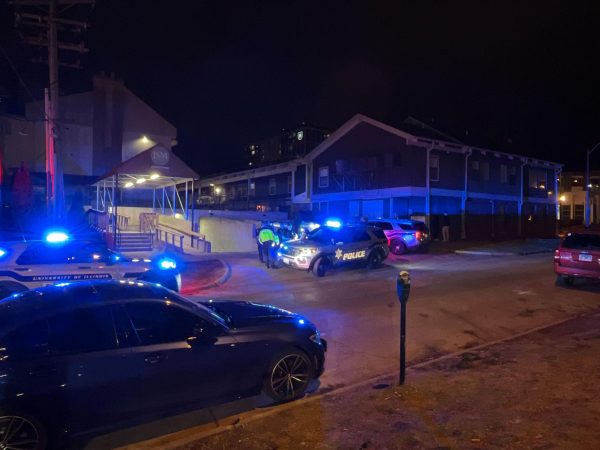Air force ROTC’s Dining Out keeps to tradition
ROTC Air Force members gather and converse at the ROTC dinner.
December 5, 2016
On Aug. 14 1945, Capt. Jerry Yellin flew the final combat mission of World War II.
Phillip Schlamberg, Yellin’s wing-man, was the last man in World War II to die on a combat mission.
Today, Yellin travels the country, visiting high schools and universities to impart wisdom on ROTC participants.
At the University, the Air Force ROTC program, like other ROTC programs, tends to fly under the radar.
This year Yellin was the guest speaker of the Air Force ROTC’s dinner event, Dining Out.
Get The Daily Illini in your inbox!
Dining Out is an event held by the Air Force ROTC program where cadets are permitted to bring guests to a formal dinner. About 150 guests attended the event Thursday at the Colonnades Club in Memorial Stadium.
Madeline Blankensop, the wing commander of detachment 190 and senior in Nursing, said Dining Out is an opportunity for members of the Air Force ROTC to socialize and get to know each other better.
“It’s always the end of the semester, it’s a nice time to be with your friends and peers and just get to relax a little bit,” Blankensop said. “Obviously there are still the military customs and courtesies, but it’s a time to have fun and it’s a time to celebrate the end of the semester.”
One of Dining Out’s most famous traditions is the grog, which consists of two toilet bowls filled an unpleasant mixture of food and drinks such as corn flakes, pickles, orange juice and Gatorade. The senior cadets decide what goes into the grog.
Air Force cadets volunteer to stand up and say a rhyme that includes an invitation for another cadet to either respond with a rhyme or drink from the grog. During Dining Out, there is a set of rules that every cadet must follow, such as the requirement to rise from his and her chair if a woman rises from the table. If cadets violate a rule, or if they are in violation of the dress code, they are required to drink from the grog.
When called upon by other ROTC members via rhyme, one has to approach the grog, salute it, fill a cup one-third with the grog, toast “to the mess” and drink the grog without removing the cup from the lips. After drinking every last drop, one must salute the toilet bowls and walk away.
The grog is a military tradition that dates back decades and it is present in most military dinners, connecting all branches of the military.
“The grog is nasty,” Blankensop said. “Everyone does this so it’s kind of almost like a rite of passage.”
Blankensop thinks the location of the event was appropriate because the Colonnades Club has a lot of historical meaning to the ROTC program.
“All of the columns stand for those fallen in war, on each end all of the fallen Illini are inscribed into the wall,” Blankensop said. “So there is a lot of history here as opposed to just doing it at the Union or like a hotel banquet hall. We’re a land-grant school so this school has a lot of military history.”
Omar Haney, senior in LAS and cadet in Air Force ROTC, played a big role in planning this year’s Dining Out. Haney agreed that Dining Out is special for members of ROTC, and was especially grateful for the venue and speaker this year.
“The venue is just amazing,” Haney said. “I mean, the Colonnades Club is almost impossible to secure and the fact that we were in location with so much military history, with a guest speaker who is, himself, military history, made this night so much more special.”
There were many teary eyes as Yellin, the guest speaker, gave a brief account of his final combat mission and advice for future members of the military.
Yellin began his speech by describing the last days of World War II. The room was completely silent and full of respect for the esteemed veteran. Yellin explained why he travels the country telling his story and why the next generation of military men and women are a big role in defending the U.S.
“You have taken on a mission that 16 million of us took on in World War II,” Yellin said during his speech. “The headlines that I read in 1936 spoke about racial problems in America, about religious problems in Germany, where they were persecuting the Jews, and about countries who were willing to kill other people for what they believed. The headlines today in 2016, are the same.”
Yellin explained that the only difference today is science and the capability of nuclear warfare to cause harm. He said it was up to America and the people he saw in front of him at the event to protect the world.
“If military men are willing to give their lives in the line of good to protect other people, no one can do more than offer themselves in sacrifice for what we believe in, in America,” Yellin said.







